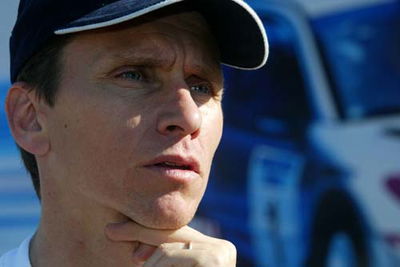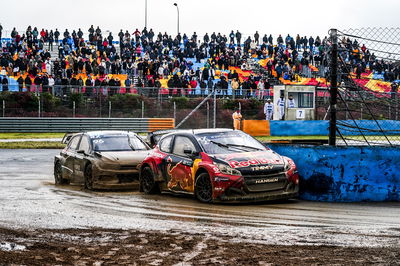Q&A: Gilles Panizzi.
Forced to sit out two rounds of the World Rally Championship following a bad fall in his house, Gilles Panizzi returns to the Peugeot squad for its assault on the 2002 Sanremo Rally.
The Frenchman, who lives close to the Italian border, will practically be on home ground and once again stands out as favourite despite his recent injury.

Forced to sit out two rounds of the World Rally Championship following a bad fall in his house, Gilles Panizzi returns to the Peugeot squad for its assault on the 2002 Sanremo Rally.
The Frenchman, who lives close to the Italian border, will practically be on home ground and once again stands out as favourite despite his recent injury.
Q:
Gilles (Panizzi). Your accident at home was a bad stroke of luck...
Gilles Panizzi:
It was a stupid fall incurred while changing a neon light. As luck would have it, I injured my right shoulder which had already been weakened in an accident dating back to December 1990. I knew almost at once that the amount of time needed before I could get back into a rally car would be incompressible. I had three fairly big pins put in so I didn't have to be put in plaster, but a lay up of three weeks was still necessary because the ligament was also torn.
Q:
How frustrating was it to follow the Finland and Deutschland Rallies as a convalescing spectator?
GP:
Really not too bad. I am always quick to put things into perspective and I just wanted to get on with the reconstruction phase as soon as possible. All my energy immediately went into making a full recovery. During these two events, I was in contact with the team all the time and I kept my fingers crossed for Peugeot to come away with maximum points. One thing that was a bit frustrating was the fact that I couldn't go to Germany to be with the team and be on-hand to give advice if required. But I really needed another week at home and, anyway, they got on magnificently well without me. So I have no regrets...
Q:
What was your programme to get you up and running so quickly?
GP:
Once the fracture was consolidated, I used equipment produced by the specialist company LPG designed to drain the injury and favour blood circulation, a process that allows top class athletes to recover exceptionally quickly. The next phase was to switch to active re-education, which meant working on the mobility of my shoulder and rebuilding my muscles. This programme was stepped up every day and was rounded off with a spell at a specialist sports centre in the south of France, near Fr?jus.
Q:
Do you think you have sufficiently recovered to live up to your rank as favourite in Italy?
GP:
Only my stage times will tell. The consolidation of the fracture will be at an advanced stage, but not total. I might find a problem with the speed of my right arm when making reflex movements. I will have to adapt my driving style accordingly and that might result in a slight drop-off in speed, especially if certain movements prove painful. Happily, today's 206 WRC is easy and comfortable to drive, and the steering wheel mounted gearshift will facilitate things. Meanwhile, my motivation will be at least one hundred per cent.
Q:
This will be your first competitive drive in the 2002 version of the 206 WRC on asphalt. What are your expectations?
GP:
Peugeot came away from Germany with sixteen points and Marcus Gr?nholm could have won if he hadn't been slowed with hydraulic problems on the opening day. The performance of my team-mates showed the car's potential, especially in conditions of low grip. The suspension, traction, engine flexibility and drivability have all been improved on the 2002 version, so its main asset is its dynamic balance. The icing on the cake is the new active anti-roll bar which is well developed today and could represent an advantage. To what extent will depend on conditions and how the weather turns. On top of that, we benefit from excellent Michelin tyres which are very well suited to the new car, so there is every reason to feel confident.
Q:
Peugeot Sport currently dominates the world rally scene. What do you believe are the team's strengths?
GP:
First of all, the team is perfectly bonded and everyone's roles are complimentary, from the mechanics and senior management to the drivers and engineers. The experience it has accumulated is also important. We make fewer and fewer mistakes with the set-up of the car and we saw this again in Germany. I wasn't there of course, but the combination of the set-up we established after pre-event testing and the car's basic qualities enabled Marcus and Richard [Burns] to play leading roles despite not being tagged asphalt specialists. Lastly but not least, we never underestimate the competition; we never stop working. Before Sanremo, we went testing in Corsica, but more with a view to preparing for the future than to do any specific work for the Sanremo Rally, for which we already have good benchmarks...
Q:
As your record indicates, you know the Sanremo Rally very well. How do you think the 2002 event will go?
GP:
I like the asphalt, I like the country and I like the roads, but I don't really like the Sanremo Rally's exceptionally compact format which is restricted to just four special stages. I know the region well, so I know there are plenty of options that would allow you to organisation an event of a completely different scale. In my view, the current route is too skimpy and it will be difficult to pull out big gaps on stages we will know by heart. The only unknown factor is the weather. The date of this year's rally has been brought forward and we could just as easily find ourselves in the middle of a heat-wave or face extremely stormy conditions, although there is little chance of the weather being changeable.










